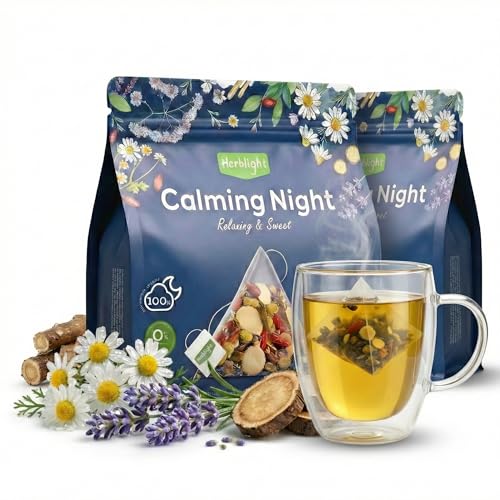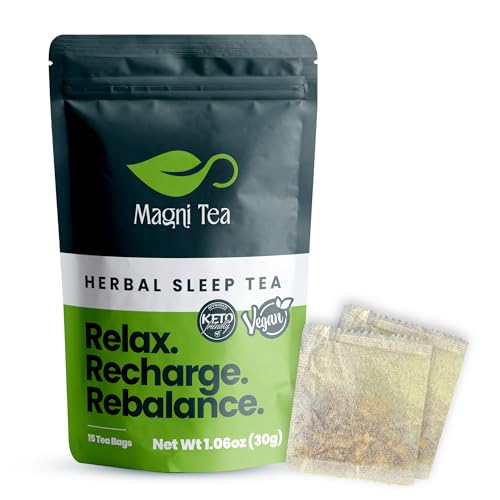Struggling to unwind after a long day? You’re not alone — millions wrestle with restless nights and sleep problems. At DailysFuel, we believe better sleep starts with daily fuel: routines, nutrients, and intentional choices. Let’s explore four natural ways to enhance sleep efficiency, improve REM sleep, and wake up energized.
🍵 Sip a Sleep-Friendly Bedtime Tea Blend
Incorporating a warm cup of bedtime tea into your nightly routine can significantly enhance the quality of your rest. Drinks for sleep, such as chamomile tea, passionflower tea, and valerian root tea, have been widely recognized for their calming effects, acting as natural sleep remedies that can help prepare both the mind and body for a restorative night’s sleep. These herbal options contain sleep-promoting properties that promote relaxation, making them excellent choices when winding down at the end of the day.
Chamomile tea, often celebrated for its anti-anxiety effects, has been shown to decrease insomnia symptoms, effectively easing the mind before sleep. Passionflower tea is another powerful herb known to boost levels of the neurotransmitter GABA, which plays a crucial role in promoting relaxation and improving overall sleep quality. Valerian root is particularly notable for its sedative effects, helping shorten the time it takes to fall asleep and enhancing deep sleep cycles. Together, these ingredients create a soothing blend that can be combined into a single bedtime tea blend.
To maximize the sleep-enhancing benefits of herbal tea, aim to sip a warm cup about 30 minutes before bedtime. This ritual not only allows your body to physically begin to wind down but can also signal the brain to prepare for sleep onset. One product to consider is the Sleepwell herbal tea blend, which combines these calming herbs into a delicious and relaxing beverage. Its carefully crafted formula is designed to be both effective and enjoyable, making it a perfect addition to your evening routine.
For those looking to explore other drinks for sleep, consider trying ashwagandha tea, coconut water, or tart cherry juice. These alternatives offer unique sleep-promoting properties and can be incorporated into your bedtime routine for variety.
🌙Build a Consistent Wind-Down Routine
Establishing a consistent bedtime routine can significantly enhance sleep efficiency and overall well-being. A nightly ritual that signals to the body that it is time to prepare for sleep encourages relaxation and makes it easier to transition into a restful state. By engaging in stress relief activities during this period, individuals can create a conducive atmosphere that aids in sleep onset.
One effective method is to dim the lights in your environment as the evening approaches. This gradual dimming can mimic the setting sun, thereby signaling to your body that it is time to start winding down. Light exposure plays a critical role in regulating the circadian rhythm; as natural light decreases, your body starts to produce melatonin, a hormone that promotes sleep. Additionally, setting aside electronic devices is crucial, as the blue light emitted from screens can disrupt the production of melatonin and hinder your ability to fall asleep.
Incorporating gentle activities into your wind-down routine can further enhance its effectiveness. Reading a book or practicing mindfulness through meditation allows your mind to unwind and detach from daily stressors. Gentle stretching or yoga can also be beneficial, as it helps to release tension accumulated in the muscles over the day, fostering relaxation. These activities not only contribute to physical relaxation but also help in achieving mental clarity, making the transition to sleep smoother.
The consistency of your bedtime routine is crucial. By engaging in these calming rituals at the same time every night, you essentially train your body to recognize when it’s time to sleep and what actions precede it. Over time, this can lead to improved sleep quality, decreased sleep latency, and increased energy levels upon waking. Ultimately, a deliberate and consistent wind-down routine can serve as a natural sleep aid, enriching your physical health and mental wellness.
💡Use Soft Lighting for Better Sleep
Lighting plays a crucial role in influencing sleep quality, often overshadowed by the emphasis on other sleep hygiene practices. Harsh, bright lights from standard bulbs can significantly disrupt the body’s natural circadian rhythms and affect REM sleep. The use of warm, amber-toned lights, particularly in the evening, can offer multiple benefits when it comes to enhancing sleep efficiency. Unlike stark white or blue-tinted lighting, which can simulate daylight and hinder the production of melatonin, warm lights encourage a sense of calm and relaxation, creating a more conducive environment for sleep.
Many people find that transitioning to softer lighting in the hours leading up to bedtime helps signal to their bodies that it is time to wind down. The gentle glow of amber-toned lights or Himalayan salt lamps can promote a tranquil ambiance that not only prepares the mind for rest but also supports the body’s natural mechanisms to facilitate sleep. The calming effects of this type of lighting can significantly improve overall sleep patterns, making it a simple yet effective solution for sleep difficulties.
Additionally, salt lamps are not just aesthetically pleasing; they are also believed to have other health benefits, such as improving air quality. Incorporating a warm light source like an amber sleep lamp into one’s bedroom can therefore serve a dual purpose: enhancing the sleep environment while potentially supporting overall health. Guests can benefit from a variety of options available online, which align perfectly with the goal of fostering a restful space.
Ultimately, the shift from harsh, artificial lighting to softer alternatives can significantly impact sleep quality. By embracing warmer tones in the evening, individuals may find it easier to unwind, leading to deeper and more restorative sleep patterns.
🧘Practice Sleep-Focused Breathwork and Consider Supplements
Establishing a calming pre-sleep routine can significantly enhance sleep quality. One effective method for initiating relaxation is sleep-focused breathwork, which can help to soothe the nervous system and signal the body that it is time for rest. Techniques such as the 4-7-8 breathing pattern and box breathing are particularly beneficial for addressing sleep problems. The 4-7-8 technique encourages inhaling for four counts, holding the breath for seven counts, and exhaling for eight counts. This method encourages mindfulness and focus, providing an effective way to decrease anxiety, paving the way for deeper sleep. Similarly, box breathing (inhaling, holding, exhaling, and holding for equal counts) promotes serenity, preparing the body mentally and physically for restorative slumber.
In addition to breathwork, considering natural sleep supplements can profoundly influence sleep quality. Herbal supplements such as magnesium, melatonin, and l-theanine are known for their positive effects on sleep. Magnesium plays a pivotal role in regulating neurotransmitters that send signals to the nervous system, ultimately promoting relaxation. Furthermore, studies suggest that magnesium consumption can result in improved sleep quality by helping to manage insomnia. Melatonin is also recognized for its role in regulating sleep-wake cycles, offering a natural remedy to combat sleep disturbances. On the other hand, l-theanine, an amino acid found in green tea leaves, promotes relaxation without inducing drowsiness, making it an excellent addition to your evening routine.
When selecting these supplements, it is paramount to choose high-quality, well-reviewed products to ensure their efficacy. For instance, Magnesium Calm Gummies are highly recommended for their pleasant flavor and ease of consumption, promoting restful sleep. Integrating effective breathwork and quality sleep supplements into your routine can create a harmonious environment conducive to achieving deeper sleep and waking up energized.
Final Thoughts on Better Sleep Habits
Achieving better sleep is not merely a destination, but rather a journey that involves making small, intentional changes over time. Many individuals seek immediate results, often becoming disheartened when they do not experience instant improvements. However, it is essential to recognize that quality sleep is built through gradual adjustments in daily habits, rather than through overnight transformations. A consistent and holistic approach is key to fostering a more restorative sleep environment and reaping the numerous sleep benefits.
One effective way to enhance your sleep quality is to incorporate a soothing herbal tea into your evening routine. Not only can bedtime tea serve as a natural sleep aid, but its calming properties may also convey a sense of relaxation, preparing the mind and body for a restful night. Popular choices such as chamomile tea, lavender tea, or lemon balm tea have been associated with enhanced sleep, providing gentle support as you unwind. Furthermore, ensuring adequate intake of magnesium through your diet or supplements may also promote relaxation. Magnesium helps regulate neurotransmitters that send signals to your brain, assisting in the transition to sleep.
Consider implementing one of these habits into your routine tonight—whether it is sipping herbal tea before bed, integrating magnesium-rich foods, or establishing a consistent sleep schedule. These small yet meaningful changes can lead to a significant impact on your overall energy, mood, and cognitive clarity. As these habits solidify, you may find yourself waking up refreshed and revitalized, ready to tackle the day ahead. By prioritizing your sleep through these simple adjustments, you pave the way toward a healthier lifestyle that values restorative rest. Ultimately, the goal is to create sustainable sleep solutions that nurture both your mind and body, providing long-lasting stress relief and improved overall well-being.
Discover more from Morning Fuel for Mind & Body
Subscribe to get the latest posts sent to your email.






